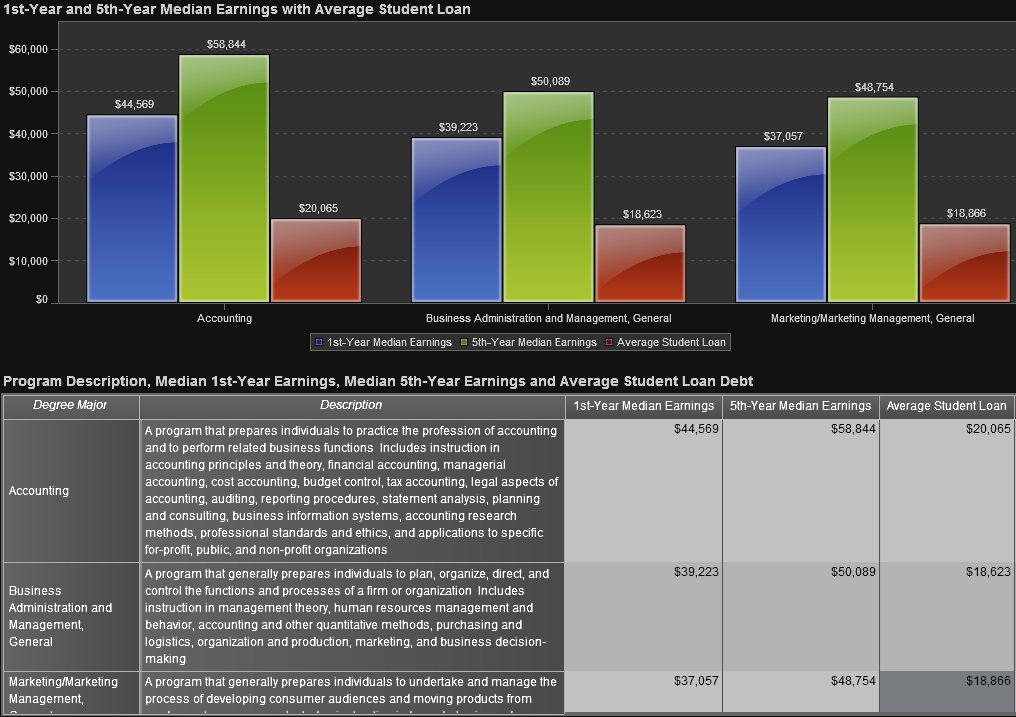You have /5 articles left.
Sign up for a free account or log in.
The University of Texas System on Thursday unveiled an ambitious data tool that gives current and prospective students a wealth of information about how recent graduates like them have fared in the job market.
The website, SeekUT (search + earnings + employment = knowledge), links with records from the Texas Workforce Commission to track 68,000 alumni of the system's 15 universities into the work force, providing earnings and loan debt levels one year and five years after graduation by institution and major.
The website and a related app also provide data on the time to degree by undergraduate major, the proportion of graduates in a major who go on to graduate study and the job and salary outlook in by occupation, educational level and region of the state.
The Texas initiative was announced on a day when many college presidents were at the White House talking about their efforts to enroll more low-income and underrepresented students.
But it responds much more directly to the other major thrust of the Obama administration's higher education agenda, one that college leaders tend to be less eager to talk about: pressuring them to prove the value they provide and the outcomes they ensure for students.
This push has grown stronger in the wake of a recession that has left increasing numbers of college graduates jobless or underemployed, and as college tuitions and student debt levels have continued to rise.
Driven by Debt Concerns
SeekUT emerged, in fact, from a Student Debt Reduction Task Force that included a "lack of transparency and accurate information on which to make sound decisions" among the list of factors that contribute to students' increasing debt burdens. Students who make poor initial decisions about a major are likelier to switch programs, for instance, unnecessarily extending their time in college.
Through existing partnerships with the National Student Clearinghouse and the Texas Higher Education Coordinating Board, UT officials already had some of the information that they concluded (based on discussions with students and others) would most help prospective and current students, including data on academic outcomes and student debt levels.
But crucial information about graduates' results in the job market -- which many institutions track only through surveys, which are incomplete and unreliable -- required a new agreement with the Texas Workforce Commission, linking UT's records with those of the state wage database.
That made it possible for the system to provide information about actual graduates' earnings one year and five years out, by institution and academic major -- essential for giving prospective and current students data that might help them make decisions about themselves, system officials say.
Some government efforts to compel dissemination of graduates' salaries have drawn criticism from college leaders, who've argued that excessive focus on economic outcomes -- and particularly short-term ones -- threatens to define higher education too narrowly as a vocational exercise. Others fear that using starting salaries as an indicator will harm liberal arts disciplines, which typically are less lucrative at first than some professional careers but pay off over the long run.
The UT officials behind SeekUT are sensitive to those dangers, though they believe that "earnings data absolutely have to be part of the picture," says Stephanie A. Bond Huie, vice chancellor for strategic initiatives for the system.
UT officials made sure to include earnings data at the five-year as well as the first-year mark, and they supplement the financial outcomes (earnings and debt, salary ranges) with numerous others that students might factor into their decisions, she notes: "degree semester credit hour requirements for specific majors, average time to degree, standard educational requirements by occupation, education beyond the baccalaureate by major." (Huie asserts that with all of those features and data, SeekUT is more complete than other comparable efforts, such as Florida's Beyond Education website and a site in Texas produced by College Measures.)
Surprisingly Positive Numbers
Those who fret that reporting earnings outcomes will necessarily harm the liberal arts may be pleasantly surprised by the Texas system's data, its officials say.
David R. Troutman, director of strategic initiatives, notes that even in the fields that might stereotypically drive parents crazy if their children chose -- creative writing, say, at one of the system's non-flagship campuses like Arlington or Dallas, or philosophy at UT-Austin -- graduates have median earnings well into the $30,000s in the first year and between $45,000 and $50,000 by the fifth year -- against an average debt load of $21,000 to $23,000, well below the national average.
"A lot of students will look at this and realize 'I can major in art and pay my student debt,' " says Jenny LaCoste-Caputo, executive director of public affairs for the system. "A student art major whose parents are pushing her to major in econ might actually be able to use this to make her case."
Huie said UT officials are excited for their own reasons, beyond whatever utility the data have in helping students make better choices. "We now have this data, which will allow our office to study a lot of things we've never been able to study before, about how Pell students are faring and other groups are doing, for example."
The system is still a work in progress -- UT officials eventually hope to add in graduate students, allow users to cut the data by race and other demographic factors, etc. -- "but this is about beginning a conversation about data and decision making, and this is a good start."






